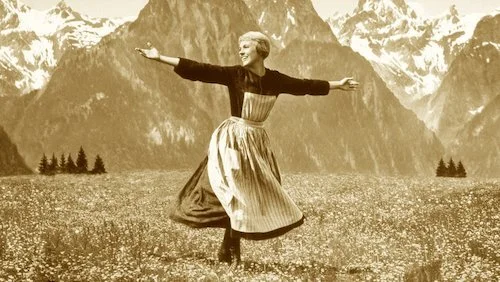The Sound of Music
This review is a part of the Best Picture Project: a review of every single Academy Award winner for the Best Picture category. The Sound of Music is the thirty eighth Best Picture winner at the 1965 Academy Awards.
So far, the sixties have already awarded two other musicals the Best Picture honour (West Side Story, and My Fair Lady), and the decade is going to contain one other musical winner (Oliver!). Today’s fourth entry in this special club (keep in mind, that this is almost half of the decade’s Best Picture winners) is one of the most definitive musicals of all: The Sound of Music by Robert Wise (who also directed West Side Story). I say that, because it is likely the most undeniably musical-based films ever. Ever. All of the songs are known by most people (even those that have never seen the film). Julie Andrews twirling around the mountain range at the start of the film is a well-established image of cinema. We’re all familiar with the von Trapp family singers story, whose real tribulations served as the basis for this film (it’s based on a personal recounting by Maria von Trapp).
For me, it’s a fun, sugary, good time, and that’s virtually it. We get three hours for Julie Andrews to knock our socks off with her singing capabilities, Christopher Plummer to convince the world why he’s one of Canada’s elite actors, and all of the von Trapp children to smother us with charm and cuteness. D’awww. This is such a loving film. I have to be honest. That’s a little off putting. I mean, we’re dealing with some difficult stuff here, particularly the Nazi takeover of most of Europe. We get some brushes with danger and severity, but I don’t suppose most viewers ever actually think the von Trapps are going to be threatened at all this entire film. For everything to be hunky-dory, especially in the unimaginable events of escaping past various Nazi officers, in a three hour film? That’s a little bit difficult to swallow for me.
Maria spinning around, in a world before Nazi rule limited the freedoms of many.
It may be hard for me to gush about The Sound of Music, but it’s also difficult to hate on it too much. It’s just a sweet, harmless musical that wants to light audiences up, and that’s about it. You stay for the songs, the warmth, and the cheese. The Sound of Music stays in the hearts of millions, because there isn’t much to hate about this film. For me, there also isn’t much to adore, either. It’s an accessible crowd pleaser. For crying out loud, it takes an entire song for them to say farewell, like it’s you not being able to leave a family function because you love everyone too much to bid them adieu. If you want to feel hugged for three hours, here you go (although I’m sure you’re well familiar with The Sound of Music by now).
Andreas Babiolakis has a Masters degree in Film and Photography Preservation and Collections management from Ryerson University, as well as a Bachelors degree in Cinema Studies from York University. His favourite times of year are the Criterion Collection flash sales and the annual Toronto International Film Festival.





